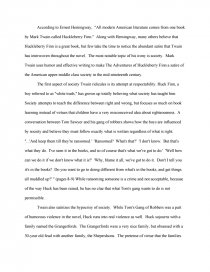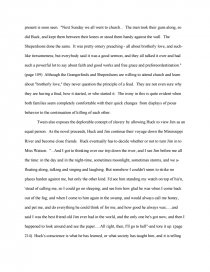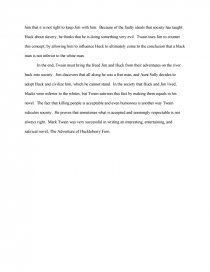Satire in Huckleberry Finn
Essay by review • February 25, 2011 • Essay • 962 Words (4 Pages) • 1,659 Views
According to Ernest Hemingway, "All modern American literature comes from one book by Mark Twain called Huckleberry Finn." Along with Hemingway, many others believe that Huckleberry Finn is a great book, but few take the time to notice the abundant satire that Twain has interwoven throughout the novel. The most notable topic of his irony is society. Mark Twain uses humor and effective writing to make The Adventures of Huckleberry Finn a satire of the American upper-middle class society in the mid-nineteenth century.
The first aspect of society Twain ridicules is its attempt at respectability. Huck Finn, a boy referred to as "white trash," has grown up totally believing what society has taught him. Society attempts to teach the difference between right and wrong, but focuses so much on book learning instead of virtues that children have a very misconceived idea about righteousness. A conversation between Tom Sawyer and his gang of robbers shows how the boys are influenced by society and believe they must follow exactly what is written regardless of what is right. "...'And keep them till they're ransomed.' 'Ransomed? What's that?' 'I don't know. But that's what they do. I've seen it in the books, and so of course that's what we've got to do.' 'Well how can we do it if we don't know what it is?' 'Why, blame it all, we've got to do it. Don't I tell you it's in the books? Do you want to go to doing different from what's in the books, and get things all muddled up?' " (pages 8-9) While ransoming someone is a crime and not acceptable, because of the way Huck has been raised, he has no clue that what Tom's gang wants to do is not permissible.
Twain also satirizes the hypocrisy of society. While Tom's Gang of Robbers was a part of humorous violence in the novel, Huck runs into real violence as well. Huck sojourns with a family named the Grangerfords. The Grangerfords were a very nice family, but obsessed with a 30-year old feud with another family, the Sheperdsons. The pretense of virtue that the families present is soon seen. "Next Sunday we all went to church... The men took their guns along, so did Buck, and kept them between their knees or stood them handy against the wall. The Sheperdsons done the same. It was pretty ornery preaching - all about brotherly love, and such-like tiresomeness; but everybody said it was a good sermon, and they all talked it over and had such a powerful lot to say about faith and good works and free grace and preforeordestination." (page 109) Although the Grangerfords and Sheperdsons are willing to attend church and learn about "brotherly love," they never question the principle of a feud. They are not even sure why they are having a feud, how it started, or who started it. The irony in this is quite evident when both families seem completely comfortable with their quick changes from displays of pious behavior to the continuation of killing of each other.
Twain also exposes the deplorable concept of slavery by allowing Huck to view Jim as an equal person. As the novel proceeds, Huck
...
...


